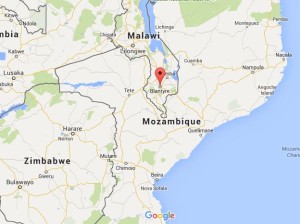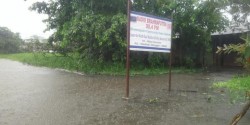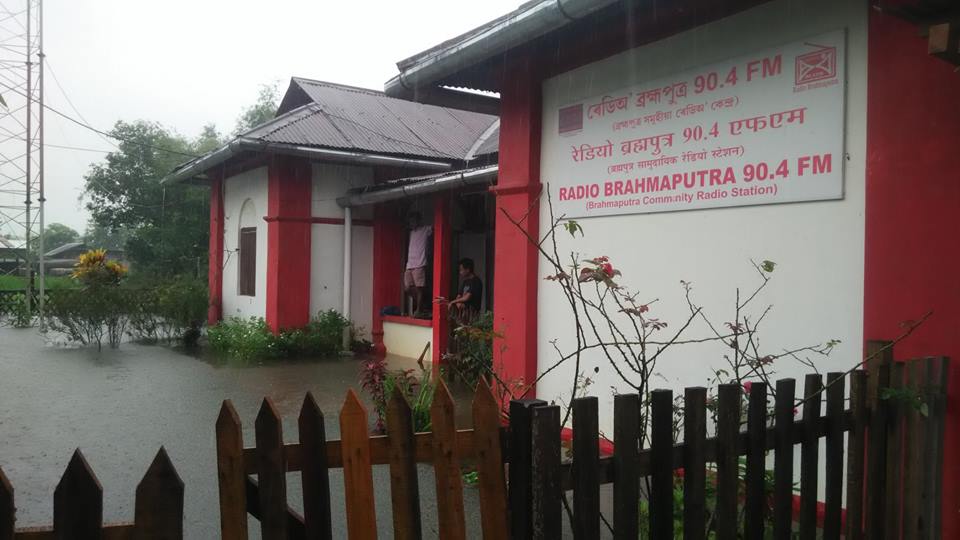Radio Brahamaputra (90.4 FM) has been dealing with floods of late. The community radio station broadcasts to the Indian state of Assam from the city of Dibrugarh. Assam is India’s easternmost state, sandwiched between Bhutan and Bangladesh. Dibrugarh has been struggling with rains and breaks in the powerful Brahmaputra River, hence the flood.
The station has posted photos of the consequences on its Facebook page. Here’s the most explanatory of them:
“Broadcasting is halted temporarily for now,” thanks to a “disruption of electricity supply,” notes the Assam Times in a story about the situation.
The frequency began streaming FM in 2012 to the various island villages on the Brahmaputra as well as more urbanized areas near the river. Its reporters represent people who speak five different languages in the region: Assamese, the tea garden dialect of Chadri, Bodo, Mishing, and Bhojpuri, the last the dialect of migrants coming from Bihar and Uttar Pradesh. Radio Brahmaputra streams talk shows and interviews, plus music programs and even quiz shows for children.
I am unable to immediately determine how the signal has dealt with the flood since the above photo was posted some days ago. More news when I get it.
At least Radio Brahmaputra has not been rebuked for trying to keep its listeners updated on flood conditions. The same cannot be said for Radio Ufulu of Malawi, which has been officially warned for supposedly broadcasting false information about the impact of recent floods on a local Christian school in the area. The Maravi Post of Malawi reports that Malawi’s broadcast regulator concluded that in early January:
“the station broadcast a program where they alleged that Kalibu Academy was affected by floods and that the students were in danger and in need of urgent rescue from their parents which contravened the third schedule to the Communication Act containing the code of conduct for broadcasting services.”
 Ufulu “failed to verify the accuracy of the information it was broadcasting,” a state offense, apparently.
Ufulu “failed to verify the accuracy of the information it was broadcasting,” a state offense, apparently.
Radio Ufulu, by the way, is allegedly owned by a former President of Malawi, Joyce Banda, recently identified by Forbes as one of the world’s most powerful women. This was unfavorably noted by The Malawi Oracle Times in 2013 (back when Banda was still president). Mrs. Banda is a complex political figure; her attempts to reestablish better economic relations with the west came under constant attack during her Presidency. There were also many allegations of corruption. On the other hand she championed domestic violence laws for women and opposed Malawi’s anti-homosexuality statute.
In any event, there is no question that heavy flooding took place in Malawi that month. The London Guardian reported that the floods displaced nearly a quarter of a million people. The affected included residents of Blantyre, Malawi’s second largest city, where the Kalibu Academy operates. The Flood List tracking service identifies Blantyre as an area in which at least 560 households were displaced by the out of the control water flow. Indeed, the Kalibu Academy’s own blog documents the devastation:
“Even in the Blantyre area there were many houses destroyed by rushing water. One of our Academy teachers, Mr. Nhlane, was awakened by a neighbor to flee from his house as water was rushing down from the mountain behind them. The water and debris swept Mr. Nhlane’s house and possessions away. He escaped to see it all happen, but a neighbor lost his entire family.”
One would think that Radio Ufulu would be forgiven for making some errors in the chaos of emergency reporting, but apparently not. Hopefully politics did not have anything to do with Ufulu’s regulatory warning, but I have my doubts.
 All this radio flood news is leading up to an interesting editorial in Newsday of Zimbabwe. It is titled “Community radio stations should promote climate awareness.” Author Peter Makwanya writes:
All this radio flood news is leading up to an interesting editorial in Newsday of Zimbabwe. It is titled “Community radio stations should promote climate awareness.” Author Peter Makwanya writes:
Community radios remain the medium of choice for engaging local discussions on how the environment is failing them or how they are even failing the environment themselves. This is the same, one and only environment they have known for the rest of their lives and they are quite better placed to nourish it. As the mouth-piece of the marginalised, community radios provide these people with time and space to articulate issues about what has happened to their rivers, wetlands, springs, weather patterns, flora and fauna including the normally dependable rainfall patterns.
Here is hoping that Radio Brahmaputra will be broadcasting again soon and that community radio stations in Africa trying to keep up with weather emergencies will be spared the effects of that old saying: “no good deed goes unpunished.”




